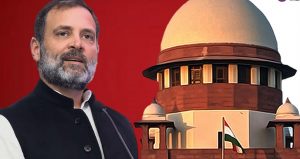
Delhi: The Supreme Court on Friday stayed the conviction and two-year jail term imposed on Congress leader Rahul Gandhi by a Gujarat court in a criminal defamation case for his remark “All thieves have Modi surname” [Rahul Gandhi vs Purnesh Ishwarbhai Modi and anr].
A bench of Justices BR Gavai, PS Narasimha and PV Sanjay Kumar said that the trial court did not give any specific reasons for imposing the maximum punishment of two years’ imprisonment prescribed under the Indian Penal Code (IPC) for the offence of defamation though the offence is a non-cognizable one.
The apex court further noted that that the ramifications of the ruling (of conviction) are wide and affect the rights of electorate of Wayanad, the constituency which Gandhi was representing as a member of parliament (MP) in the Lok Sabha.
He had been disqualified from parliament after his conviction in the case.
“We are of the considered view that the ramifications of the ruling are wide, and affect the rights of his constituency’s electorate. Considering the aforesaid and particularly that no reasons have been given by the trial judge for maximum sentence which has incurred disqualification, order of conviction needs to be stayed pendency of proceedings,” the top court ordered.
With this order, Gandhi’s membership to Lok Sabha from Wayanad would stand restored.
Pendency of appeal would not come in way of appellate court in deciding appeal in accordance with law, the Court added.
The Court in its order underscored that the trial judge was expected to give reasons for imposing maximum punishment for a non-cognizable offence.
“No specific reason has been granted by trial judge to impose maximum sentence apart from a comment by this Court. Had the sentence been even a day lesser, the provisions (pertaining to disqualification) would not have applied. Learned trial judge was at least expected to give reasons for imposing maximum sentence for not cognizable offence,” the Court said.
The Court also noted that the Sessions Court and the Gujarat High Court too did not go into that aspect.
“Though the learned appellate court and High Court have spent voluminous pages in denying stay on conviction, these aspects have not been gone into,” the order noted.
At the same time, the Court also said that persons in public life should exercise caution while making statements.
Gandhi moved the top court after a Magistrate court convicted him and a Sessions Court as well as the Gujarat High Court refused to stay the conviction.
The Supreme Court had last month issued notice on the plea by Congress leader.
Gandhi’s plea before the apex court was limited to a prayer for stay on conviction and two-year sentence imposed by the Magistrate court.
The now disqualified parliamentarian was convicted by a Magistrate court in Surat on March 23 for his remark that he had made at an election rally in Karnataka’s Kolar constituency, in 2019.
Gandhi had, in his speech linked Prime Minister Narendra Modi with fugitives like Nirav Modi and Lalit Modi.
He had said, “Nirav Modi, Lalit Modi, Narendra Modi. How come all the thieves have ‘Modi’ as a common surname?”
The proceedings in the instant case arose after Purnesh Modi, a former BJP Member of Legislative Assembly (MLA), had taken exception to the the remarks in question, claiming that Gandhi humiliated and defamed persons with the Modi surname.
The magistrate court accepted the contention of Modi that by his speech, Gandhi has intentionally insulted the people with a ‘Modi’ surname.
In his 168-page judgment, Judge Hadirash Varma said that since Gandhi is a Member of Parliament (MP), whatever he says will have a greater impact. Thus, he should have exercised restraint, the Magistrate ruled.
A sessions court in Surat had, on April 20, dismissed Gandhi’s plea seeking suspension of his conviction by the Magistrate court.
Gandhi then moved the High Court, which too refused to extend relief to him leading to the present appeal before the top court.
Purnesh Modi in his counter-affidavit before the Supreme Court contended that Gandhi has remained arrogant and refused to apologise.
In response, the Congress leader remained steadfast in his stance that he is not guilty of the offence of criminal defamation.
He said that if he wanted to apologise and compound the offence, he could have done it much earlier.